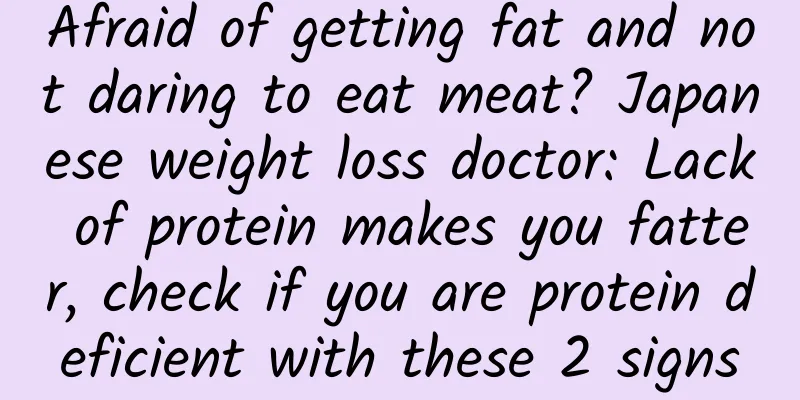Afraid of getting fat and not daring to eat meat? Japanese weight loss doctor: Lack of protein makes you fatter, check if you are protein deficient with these 2 signs

|
Many women who love beauty are afraid to eat meat for fear of getting fat. They are afraid that eating meat will make them gain weight and lose their figure! Is eating meat really a landmine for weight loss? Is eating meat so terrible? Japanese weight loss experts say that meat is one of the important sources of protein for the human body. If you don't eat meat in order to lose weight, and don't supplement with bean products to get protein, it will be easier to gain weight as your basal metabolism slows down and you lack protein! Get fat or lose weight? Basal metabolic rate is the keyIn his book "Eat a Lot of Meat and Lose 5 Kilograms in a Week on the Ketogenic Diet," Dr. Ryozo Saito, vice president of the Japan Functional Weight Loss Association, mentioned that lack of protein makes it easy to gain weight because the basal metabolism slows down. "Basal metabolic rate" is the basic calories that are "consumed just by lying down". The basal metabolic rate is the minimum amount of calories required to maintain body temperature, breathing, or keep the internal organs and brain functioning. Of the calories consumed in a day, basal metabolism accounts for about 70%. Whether a person will gain weight or lose weight depends on whether the calories consumed by the diet are balanced with the calories consumed by the body. If the basal metabolic rate is high, the calories consumed are likely to exceed the calories consumed, so it is less likely to gain weight; conversely, if the basal metabolic rate is low, the calories consumed are likely to be less than the calories consumed, so it is easier to gain weight. How to increase basal metabolic rate? Muscle mass has a big impactThe main factor that affects the basal metabolic rate is "muscle". Muscle is like an engine that is always running. Even if the body is motionless, it will still burn body fat to maintain body temperature and carry out metabolic activities, which account for about 20% to 30% of the basal metabolic rate. The main factor affecting basal metabolic rate is "muscle". Muscle is like an engine that is always running. Even if the body is motionless, it will still burn body fat to maintain body temperature and carry out metabolic activities, which account for about 20% to 30% of the basal metabolic rate. In the basal metabolic rate, the metabolic rate of the brain or internal organs is almost fixed, but the metabolic rate of muscles can vary greatly depending on a person's lifestyle. If you exercise regularly to build up your muscles, your basal metabolic rate will increase and you will be less likely to gain weight. On the contrary, if your muscle mass decreases due to lack of exercise, your basal metabolic rate will also decrease and you will be more likely to gain weight. Lack of protein makes you fatter? The reason is: it is indispensable for muscle formationIt is also worth noting that Dr. Ryozo Saito pointed out that in addition to exercise, the amount of protein intake will also greatly affect the increase or decrease of muscle mass. Muscles are "metabolizing" 24 hours a day, repeatedly breaking down and synthesizing without sleep. In fact, apart from water, muscles are mostly made up of protein. Therefore, when the human body lacks protein, muscle mass will decrease due to lack of raw materials, which will in turn affect metabolic function. Once the metabolism slows down, the body will easily gain weight. Be careful if you have these two symptoms and check yourself for protein deficiencyHow do you know if your protein intake is insufficient? In addition to medical examinations, Dr. Saito Ryozo pointed out that there are actually two signs that can be self-tested to know whether protein intake is sufficient: Symptom 1: The first test method is that if your hands and feet turn yellow when you eat oranges or tangerines, it may mean that you are lacking in protein. The yellow color of oranges or tangerines comes from pigments such as retinol and β-cryptoxanthin, and proteins are responsible for transporting these pigments in the blood. If your hands and feet turn yellow when you eat oranges or tangerines, it may be a sign that you are protein deficient. Once there is a lack of protein, the protein that transports pigments will also be insufficient. Since retinol or β-cryptoxanthin is not transported to the required tissues, pigments are deposited, causing extremities such as the hands and feet to turn yellow. This situation is like there are not enough trucks to deliver goods, resulting in overflowing inventories in warehouses everywhere. Sign 2: The second reason is that "edema is difficult to subside", which may also be due to protein deficiency. Edema can be regarded as evidence of the body's lack of "albumin". Albumin is a protein produced by the liver that acts like a boat to carry enzymes and fatty acids. It is the most abundant protein in the blood. The albumin concentration in the blood is usually maintained at a certain level. About 60% of an adult's body is water, which can freely enter and exit the walls of capillaries. However, albumin cannot pass through the blood vessel walls because of its larger molecules. Once the body lacks protein, resulting in a decrease in albumin, water will seep out of the blood vessels to increase the concentration. At this time, the body will experience edema. |
Recommend
Why do you get left ovarian cysts?
Why do I get a left ovarian cyst and what are the...
Three signs of menopause in women
There are three signs that a woman is about to en...
Early symptoms of vulvar leukoplakia
In the early stages of vulvar leukoplakia, sympto...
Doctors teach you how to tell whether a woman has had an abortion?
Generally, after medical abortion or surgical abo...
How to treat bacterial vaginosis
Bacterial vaginitis can be treated with drugs suc...
What are the nursing methods for endometrial tuberculosis
In daily life, we should understand the occurrenc...
If you have pelvic inflammatory disease, you will usually have pain in your lower abdomen.
If you have pelvic inflammatory disease, you will...
When should I lose weight after giving birth? The most critical period is after the third month
Mothers who have been pregnant for 10 months were...
A brief discussion on the clinical manifestations of acute cervicitis
Cervicitis is a very common gynecological disease...
What are the auxiliary examinations for acute adnexitis?
Acute adnexitis mostly occurs in women of childbe...
Exercise can fight against 8 major cancers! Study: Exercise slows cancer growth, produces anti-cancer effects
Exercise can prevent cancer, and increasing the f...
What are the symptoms of cervical hypertrophy?
One of the most common diseases in the cervix is ...
What complications may soft ovarian cysts cause?
What complications are likely to be caused by sof...
Can endometrial tuberculosis be treated?
It is known to all that illnesses must be treated...
How to regulate irregular menstruation for women? Do these 5 things to restore menstruation
More and more women are experiencing menstrual ir...









